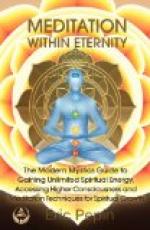Methods and systems are established consistently with the age and character of those whom they are designed to assist in finding the way.
And again we must emphasize the fact that by the phrase “the way,” we mean the way to a realization of the godhood within the inner temple of man’s threefold nature.
Thus, the intelligent, unprejudiced student of the religions and philosophies of all times and all races, will find that, while there are many and diverse paths to the goal of “salvation,” the goal itself means unity with the Causeless Cause, wherein exists perfection.
Perhaps it has been left for the expected Incarnate God, which Christians speak of as “the second coming of Christ,” to make clear the problem as to whether this attainment or completement means an absorption of individual consciousness, or whether it will be an adding to the present incarnation, of the memory of past lives, in such a manner that no consciousness shall be lost, but all shall be found.
In considering instances of cosmic consciousness, mukti, which have been recorded as distinctly religious experiences, and the effect of this attainment, the system best known to the Occident, is contained in the philosophy of Vedanta, expounded and interpreted to western understanding by the late Swami Vivekananda.
But it should be understood that the philosophy taught by Vivekananda is not strictly orthodox Hinduism. It bears the same relation to the old religious systems of India that Unitarianism bears to orthodox Christianity such as we find in Catholicism, and its off-shoots.
Vivekananda honored and revered and followed, according to his interpretation of the message, Sri Ramakrishna, whom an increasing number of Hindus regard as the latest incarnation of Aum—the Absolute. Not that the reader is to understand, that Sri Ramakrishna’s message contradicted the essential character of the basic principles of orthodox Hinduism, as set down in the Vedas and the Upanashads.
The same difference of emphasis upon certain points, or interpretations of meaning exists in the Orient, as in the western world, in regard to the possible meaning of the Scriptures.
Sri Ramakrishna, who passed from this earth life at Cossipore, in 1886, was a disciple of the Vedanta system, as founded by Vyasa, or by Badarayana, authorities failing to agree as to which of these traditional sages of India founded the Vedantic system of religion or philosophy.
Vedanta, particularly as interpreted by Sri Ramakrishna and his successors, offers a wider field of effort, and a more intellectual consideration of Hindu religion than that of the Yoga system as interpreted from the original Sankhya system by Patanjali, about 300 B.C.
Patanjali’s sutras are considered the most complete system of Yoga practice, for the purpose of mental control, and psychic development. Patanjali’s sutras are almost identical with those employed in the Zen sect of Buddhist monasteries, throughout Japan.




